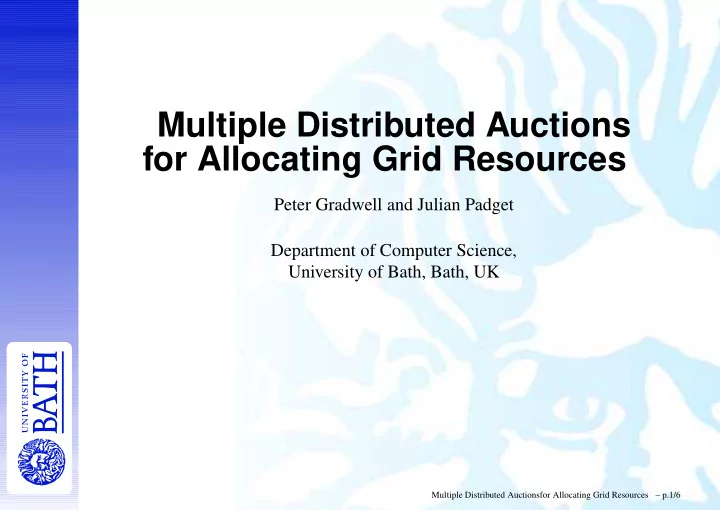

Multiple Distributed Auctions for Allocating Grid Resources Peter Gradwell and Julian Padget Department of Computer Science, University of Bath, Bath, UK Multiple Distributed Auctionsfor Allocating Grid Resources – p.1/6
Market-based Resource Allocation � Trading systems are no use if they are slower � Need for an accurate empirical model of Combinatorial Auctions: ⊲ Algorithms CABOB, CASS, LP Solve ⊲ NP-Complete ⊲ Hard increasing the number of goods makes the computation time much longer than increasing the number of bids (Fujisima, Leyton-Brown, Shoham) � Aid understanding of when to use different market mechanisms (CAs, CDA, Distributed Markets etc.) Multiple Distributed Auctionsfor Allocating Grid Resources – p.2/6
Parameters and Complexity Plot of Goods, Bids, Time Bids = 2xGoods Bids = Goods Time (ms) Time (ms) 250 200 150 100 50 0 350 300 250 200 0 20 150 40 Bids 60 100 80 100 50 120 Goods 140 0 160 � Number of goods has more impact on computation than number of bidders. � Literature demonstrates that some problems respond to heuristics, but others do not � Criteria for choosing market or auction still unclear Multiple Distributed Auctionsfor Allocating Grid Resources – p.3/6
Distributed Auctions � A market-based solution � Distributed Auctions enable cross-fertilisation of a wide range of traders and buyers — as found in grids. � Intelligent (middle) agents assemble bundles against customer requirements (actual or prospective) � Trader agents are profit motivated. � Traders may not sell all their bundles — so there is natural wastage in the system. � Multiple Distributed Auctions (MDAs) are suitable for open grids as no relationship is required between trading parties Multiple Distributed Auctionsfor Allocating Grid Resources – p.4/6
CAs vs Distributed Systems A D M Bundle Complexity Perfect Allocation CA Time � Complexity can neither be created nor destroyed � If we remove the single combinatorial auction, who does the computation? � Intelligent (middle) agents assemble bundles against customer requirements (actual or prospective) ⊲ Cost is distributed ⊲ Optimality is forfeited ⊲ Worse is better? Multiple Distributed Auctionsfor Allocating Grid Resources – p.5/6
Approaching Optimality � Current work: investigating the proximity of a MDA bundle to the (strongly) Pareto-optimal bundle. � The depth of search (and speed of result) obtainable by a CA clearing algorithms are highly dependent on the heuristics used in the computation (CABOB). � The MDA approach is very unlikely to produce a Pareto-optimal solution because has it has incomplete information � Can heuristics be used to improve the MDA bundling mechanism? � Could MDA traders remember popular bundles and assemble them pre-emptively? Market memory. � How does re-sale/re-circulation of items impact market dynamics? Multiple Distributed Auctionsfor Allocating Grid Resources – p.6/6
Recommend
More recommend